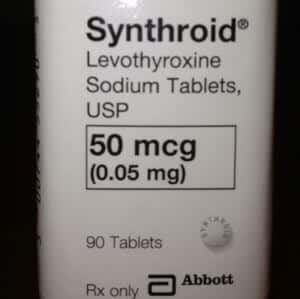
Low thyroid function is extremely common. In fact, levothyroxine, the hormone used to treat an underactive thyroid gland, is the most frequently prescribed medication in the US. Many people are aware that a person with low levels of circulating thyroid hormone may feel fatigued and weak. He may be plagued with dry skin and constipation. She might notice brittle nails and excessive menstrual bleeding. But is there a connection between thyroid and cholesterol levels? One reader is trying to track that down.
Are Thyroid and Cholesterol Levels Linked?
Q. I was recently diagnosed with low thyroid function and am taking Synthroid (.025 mg per day) to regulate it. My cholesterol level has been increasing even though, at age 51, I am the same weight as I was in college, exercise regularly and watch my diet to minimize fat consumption–all the right stuff.
A consulting physician said that there is a relationship between low thyroid function and high cholesterol, but I have been unable to find any other documentation of this. Is this a recognized fact? Does balancing the thyroid really impact the cholesterol level?
A. Scientists have found clear evidence that mild hypothyroidism is linked to higher levels of cholesterol (Frontiers in Endocrinology, Sep. 3, 2018). In one year-long study, people with untreated subclinical hypothyroidism had significantly higher LDL cholesterol than those taking levothyroxine (Endocrine Practice, July-Aug. 2008). Moreover, a review of clinical trials confirmed that slightly hypothyroid people who took levothyroxine (Levoxyl, Synthroid) had lower cholesterol levels (Clinical Endocrinology, July 2017).
Do You Need a Higher Dose?
Your dose of levothyroxine is very low. As a result of your concerns, you might ask your doctor whether it should be adjusted. To prepare to discuss this with your physician, you may wish to read our eGuide to Thyroid Hormones. This 25-page guide describes symptoms of low thyroid function, including elevated cholesterol levels as well as clumsiness and mental fogginess. It also discusses symptoms of excess thyroid hormone, including anxiety, insomnia and heart palpitations. We describe testing and treatment of both conditions.
In addition, you may wish to listen to our interview with thyroid expert Dr. David S. Cooper, Director of the Thyroid Clinic at Johns Hopkins University. We talked to him for Show 1162: How to Treat Common Thyroid Problems.
Citations
- Mikhail GS et al, "Increased atherogenic low-density lipoprotein cholesterol in untreated subclinical hypothyroidism." Endocrine Practice, July-Aug. 2008. DOI: 10.4158/EP.14.5.570
- Li X et al, "The lipid-lowering effect of levothyroxine in patients with subclinical hypothyroidism: A systematic review and meta-analysis of randomized controlled trials." Clinical Endocrinology, July 2017. DOI: 10.1111/cen.13338
- Duntas LH and Brenta G, "A renewed focus on the association between thyroid hormones and lipid metabolism." Frontiers in Endocrinology, Sep. 3, 2018. DOI: 10.3389/fendo.2018.00511

